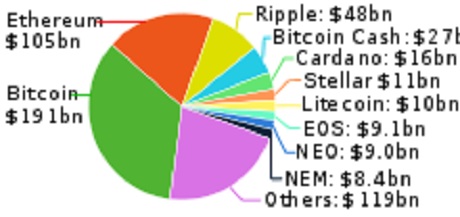
All rights reserved.
You may not copy, reproduce, republish, or otherwise use www.baltic-course.com content
in any way except for your own personal, non-commercial use.
Any other use of content requires the hyperlink to www.baltic-course.com.

Printed: 25.04.2024.
 PrintLibra – a new global digital currency
PrintLibra – a new global digital currency
 |
|---|
Bitcoin is
a digital asset designed to work as a medium of
exchange that uses strong cryptography to secure financial transactions,
control the creation of additional units, and verify the transfer of
assets. Crypto currencies use decentralized control as opposed
to centralized digital currency and central banking systems.
More in: https://en.wikipedia.org/wiki/Cryptocurrency
Short history
For example, Wikipedia
provides a short history of “digital currency” starting with an idea of digital
cash (by David Chaum in 1983), with
the DigiCash as a first electronic cash
company in 1990; after eight years it filed for bankruptcy.
Another idea of
so-called e-gold, as the first widely used “internet money” was introduced in
1996, and grew to several million users before the US Government shut it down
in 2008. Users of the e-gold mailing list used the term "digital
currency" to describe peer to peer payments in various instruments.
In 1997,
Coca-Cola offered buying from vending machines using mobile payments; the
PayPal was launched its $US-denominated service in 1998. In 2009, bitcoin was launched, which marked the
start of decentralized blockchain-based digital currencies with no central
server, and no tangible assets held in reserve.
Also known as
crypto-currencies, blockchain-based digital currencies proved resistant to
attempt by government to regulate them, because there was no central
organization or person with the power to turn them off, acknowledged
Wiki-authors.
More in: https://en.wikipedia.org/wiki/Digital_currency
Japanese digital programmer, Satoshi Nakamoto in 2008was the first to develop a bitcoin, called at that
time BTC using a de-centralised server and a database technology, blockchain;
the latter required and electronic signature and certain legitimacy for money
transactions. Initially bitcoin’s market was about 21 million, which turned
presently to $191 billion being the most popular kind of digital currency in
the world (see Table below). Buying and selling crypto-currency is available
through special Bitcoin exchange platforms or ATMs.
More in an article on Bitcoins in: https://www.bitcoin.com/get-started/
Bitcoin is
a peer-to-peer version of electronic cash that allows payments to be sent
directly from one party to another without going through a financial
institution. The network timestamps transactions by hashing them into an
ongoing chain of hash-based proof-of-work; in this way it is forming a record
that cannot be changed without redoing the proof-of-work.
More on “blockchains”
The validity of each crypto currency's coins is provided by
a blockchain, which a sort of continuously growing list of “records”,
called blocks linked and secured by using cryptography. Each block typically contains a “hash pointer”
as a link to a previous block, a timestamp and transaction
data.
By design, blockchains are inherently resistant to modification of the data: as is known, it is a sort of open, distributed ledger that can record transactions between two parties efficiently and in a verifiable and permanent way. A blockchain is typically managed by a peer-to-peer network collectively adhering to a protocol for validating new blocks.
Once recorded, the data in
any given block cannot be altered retroactively without the alteration of all
subsequent blocks, which requires collusion of the network majority.
Blockchains are an example of a distributed computing
system which solves two problems: a kind of trusted authority and a central server,
which can serve several crypto currencies.
Reference to “blockchain” in: https://en.wikipedia.org/wiki/Cryptocurrency.
Libra –a new currency
Recently, in particular during 2019, the social network
Facebook has been announcing offers of its own crypto currency Libra based on blockchain. The message
has entailed rising rates for the bitcoin as an already existing digital
currency.
Thus a social media has entered a “combat field” of digital
currencies to change the current business model and bind the users with new
services.
However, possible customers could run a strong risk from
this and other alternative currencies which are without any supervision. Even
though Facebook is planning its crypto currency as a “stablecoin”, which means it is linked to a specific governmental currency;
experts consider this trend with caution.
Reference to: https://www.valantic.com/en/facebooks-cryptocurrency-libra-adds-fuel-to-the-financial-fire/
Officials’ opinion on Libra
The head of the
US Federal Reserve, Jerome Powell, mentioned
in June 2019 that he recognized both potential benefits and risks to Facebook’s
unveiled Libra crypto-currency project.
He believed that modern
societies remain a long way from digital currencies replacing central bank
currencies, and that the central banks are not “too concerned about being able
to implement monetary policy because of them given the infancy of the digital
asset class”.
Mr. Powell acknowledged
both potential benefits and risks particularly of a digital currency such as
Facebook’s, which would have a prospectively large application.
Soon after the
Libra project was published, the French Minister of the Economy and Finance, Bruno Le Maire said that the government
intends to “ask for guarantees” from Facebook in regard to Libra.
The Bank of
England governor Mark Carney believes
“we will wind up having quite high expectations from a safety and soundness and
regulatory standpoint if they do decide to go forward with something.”\
Chairman of the
Russian State Duma Committee on Financial Market Anatoly Aksakov said that the country would not legalize the use of
the token.
Government
officials worldwide have expressed a range of opinions on Facebook’s new token,
which could have potential exposure to a combined 2.7 billion users each month.
Citations from:
https://cointelegraph.com/news/us-fed-chair-facebooks-libra-carries-both-benefits-and-risks
There are Nordic “players” in the digital currencies as well:
for example, Coinify is a global virtual currency player offering two-way virtual currency to
fiat conversion services for businesses and individuals; it was incorporated in
2014 with the headquarters in Denmark.
Coinify is backed
by five main investors: SEB Venture Capital, Nordic Eye Venture Capital, SEED
Capital Denmark, PreSeed Venture and Accelerace; besides, Bitcoin Nordic is
acquired by Coinify.
See more in : https://www.crunchbase.com/organization/coinify-com#section-overview
Table:
Most popular crypto currencies in the
world

Bitcoin as a doubtful investment
The fear of missing out on something draws the attention to
Libra, just as the current bitcoin rates. But excessive euphoria suppresses the
risks, and strong profit taking can only make a few happy, as the price is
falling again.
However, the platform operator Facebook and the members of
the appointed steering committee would profit the most as these “instances” are
in control of the fund-like organised currency.
According to Facebook, only companies having a market value
of at least one billion USD and investing ten million USD in Libra can join the
Libra’s steering committee.
Up to now, apparently 28 of such partners exist; though they
do not include any banks. Moreover, any type of regulation is missing in Libra
although it is important to define clear regulatory guidelines for crypto-currencies.
Otherwise, as some experts say, with untested
pseudo-currencies on the internet, customers would end up in the “stone age” of
payment transactions.
There is somehow
danger that the Libra crypto-currency could undermine national banks’ authority
and erode their powers to influence the economy.